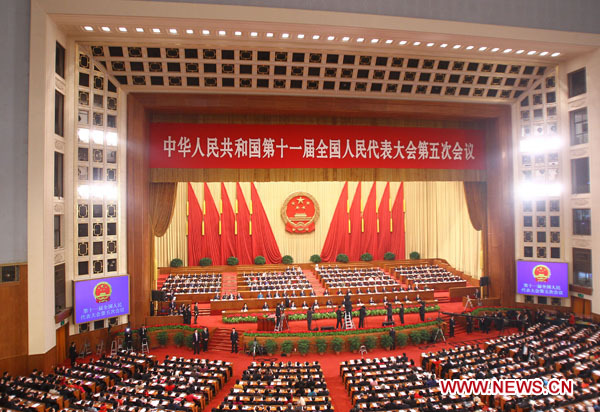Parliament Session Starts, China to "Make Progress While Maintaining Stability"
( 2012-March-5 12:50:22)
 |
| The Fifth Session of the 11th National People's Congress (NPC) opens at the Great Hall of the People in Beijing, capital of China, March 5, 2012. |
China opened its annual parliamentary session on Monday, cutting the projected economic growth to 7.5 percent and vowing to "make progress while maintaining stability" in 2012.
This is the first time for China to lower its annual economic growth target after setting it around 8 percent since 2005.
China's economy grew by 9.2 percent in 2011 after an expansion of 10.4 percent in 2010.
Premier Wen Jiabao delivered a report on the work of the government at the opening meeting, which was presided over by National People's Congress (NPC) Standing Committee Chairman Wu Bangguo.
Nearly 3,000 NPC deputies from across the country are present at the opening meeting along with top Communist Party and state leaders Hu Jintao, Jia Qinglin, Li Changchun, Xi Jinping, Li Keqiang, He Guoqiang and Zhou Yongkang.
The year 2012 is important for China amid a leadership transition at the 18th National Congress of the Communist Party of China (CPC) to be convened later this year.
Reviewing the government work in 2011, Wen said, "We consolidated and built upon our achievements in responding to the global financial crisis, and got the 12th Five-Year Plan period off to a good start."
However, he said, "We are keenly aware that China still faces many difficulties and challenges in economic and social development."
Internationally, the road to global economic recovery will be tortuous, the global financial crisis is still evolving, and some countries will find it hard to ease the sovereign debt crisis any time soon, according to the report.
The unemployment rate remains high in major developed economies, and they lack impetus for growth. Emerging economies face the dual pressures of inflation and slowing economic growth, the report said.
Domestically, it has become more urgent but also more difficult to solve institutional and structural problems and alleviate the problem of unbalanced, uncoordinated, and unsustainable development, it added.
Despite all the challenges, Wen noted that China is still in "an important period of strategic opportunities" for development, and there are a number of favorable conditions to maintain steady and robust economic development for a long time.
Industrialization, urbanization and agricultural modernization are proceeding rapidly, and improvements in the consumption pattern and the industrial structure will create huge potential demand, he said.
China still has its traditional strengths in economic development, as well as rich human resources and a more skilled workforce, he said.
"We have a good balance between government revenue and expenditures and a sound financial system, and there is ample nongovernmental capital," he said.
This year, the Chinese government will "make progress while maintaining stability", the premier stressed.
In addition to a projected GDP growth rate of 7.5 percent, other main targets for this year's economic and social development are as follows: to create more than 9 million new jobs in towns and cities, keep the registered urban unemployment rate at or below 4.6 percent and keep the CPI increase to around 4 percent, Wen said.
"Here I wish to stress that in setting a slightly lower GDP growth rate, we hope to make it fit with targets in the 12th Five-Year Plan, and to guide people in all sectors to focus their work on accelerating the transformation of the pattern of economic development and making economic development more sustainable and efficient, so as to achieve higher-level, higher-quality development over a longer period of time," he added.
"In projecting a CPI increase of around 4 percent, we have taken into account imported inflation, rising costs of factors of production, and people's ability to absorb the impact of price increases, while leaving room for the effect of price reforms," he said.
"To ensure success in all our work this year, we must uphold the theme of scientific development, take transforming the pattern of economic development as the main thread, adopt a holistic approach, and coordinate all our work. We must coordinate efforts to achieve steady growth, control prices, adjust the economic structure, improve the people's wellbeing, implement reform, and promote harmony," he said.
Economists here agreed that the policy of "making progress while maintaining stability" hits the point, which can guide the Chinese economy away from a hard landing.
Prof. Hu Angang, director of the Center for China Studies, Tsinghua University, said that by "maintaining stability," the government means to maintain a stable macroeconomic policy, realize a steady economic growth, calm the consumer price and sustain social stability.
"A comparatively low economic growth rate will avoid heated inflation, leave enough room for improving energy efficiency, curbing pollution and restructuring development pattern," he said.
Prof. Guo Guoqing from the School of Business, Renmin University of China, said "stability" and "progress" are two factors that are complementary in driving China's development..
"'Stability' forms the basis for further progress, while 'progress' should refer to breakthroughs and achievements made in transforming the economic growth pattern, deepening reform and improving people's wellbeing," Guo said.
Source: Xinhua
Top Stories
China Posts Feb. Trade Deficit
Mainland to Crack down Illegal Organizing of Pregnant Women into HK
- Zhao Qizheng Stresses Public Diplomacy for Overseas Chinese Firms
China's Political Reform Must under CPC Leadership
China's Top Legislature Concluding Annual Session
- China's Parliament Adopts 12th Five-year Plan